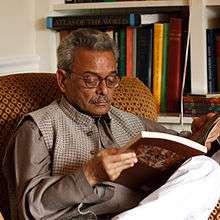Shamsur Rahman Faruqi
Shamsur Rahman Faruqi is an Indian poet and an Urdu critic and theorist. He has formulated fresh models of literary appreciation.[1] He absorbed western principles of literary criticism and subsequently applied them to Urdu literature, but only after adapting them to address literary aesthetics native to Arabic, Persian, and Urdu. [2]
Shamsur Rahman Faruqi | |
|---|---|
 | |
| Born | Shamsur Rahman Faruqi India |
| Nationality | Indian |
| Occupation | poet, critic |
Early life
He was born on 30 September 1935[3] in India. He received his Master of Arts (MA) degree in English from Allahabad University in 1955.[1]
Career
He began writing in 1960. Initially he worked for the Indian postal service (1960–1968), and then as a chief postmaster-general and member of the Postal Services Board, New Delhi until 1994. He was also editor of his literary magazine Shabkhoon and part-time professor at the South Asia Regional Studies Center at the University of Pennsylvania.[1]
An expert in classical prosody and ‘ilm-e bayan (the science of poetic discourse), he has contributed to modern literary discourse with a profundity rarely seen in contemporary Urdu critics.[1] His most recent books, The Mirror of Beauty (translated into English from the Urdu Kai Chaand The Sar-e-Aasmaan in 2006), and The Sun That Rose From The Earth (Penguin India, 2014), have been highly critically acclaimed.[4] He is the recipient of numerous honors and awards. Most recently he was awarded the prestigious Saraswati Samman for his work She`r-e Shor-Angez, a four-volume study of the eighteenth-century poet Mir Taqi Mir.[1]
- A profile in The Caravan by Nikhil Kumar[5]
- Anjum Hasan in The Caravan on The Mirror of Beauty[6]
- Rajni George in Open Magazine, profile of Shamsur Rahman Faruqi[4]
- Mayank Austen Soofi's interview with Shamsur Rahman Faruqi in Mint.[7]
Dastangoi
Dastangoi is a 16th-century Urdu oral storytelling art form.[8] The art form was revived in 2005[9] and has been performed in India, Pakistan, and the United States.[10] The art form reached its zenith in the Indian sub-continent in the 19th century and is said to have died with the demise of Mir Baqar Ali in 1928.[9] Shamsur Rahman Faruqi and his nephew, writer and director Mahmood Farooqui have played significant roles in its revival in the 21st century.[11]
Awards
He was awarded the Saraswati Samman, an Indian literary award, in 1996.[1] The Government of India awarded him the civilian honour of Padma Shri in 2009.[12]
Bibliography
- Sher, Ghair Sher, Aur Nasr, (1973)[1]
- The Secret Mirror, (in English, 1981)[1]
- Ghalib Afsaney Ki Himayat Mein, (1989)[1]
- Sher Shore Angez (in 3 volumes, 1991–93)[1]
- Mir Taqi Mir 1722-1810 (Collected works with commentary and explanation)[1]
- Urdu Ka Ibtedai Zamana (2001)[1]
- Ganj-i-Sokhta (poetry)[1]
- Sawar Aur Doosray Afsanay (2001)[1]
- Kai Chand Thay Sar-e-Asmaan (2006)[13]
See also
- List of Urdu language poets
- List of Urdu language writers
References
- "Shamsur Rehman Faruqi - The master critic". Daily Dawn-11 July 2004). columbia.edu. Retrieved 25 August 2012.
- "A Conversation with Shamsur Rahman Faruqi by Prem Kumar Nazar" (PDF). UrduStudies.com. Retrieved 13 September 2012.
- Dastan-e-Shamsur Rahman Faruqi: Life of a Writer https://caravanmagazine.in/literature/dastan-e-shamsur-literary-life-translator
- "The Last Ustad - OPEN Magazine". OPEN Magazine.
- Dastan-e-Shamsur Rahman Faruqi: Life of a Writer https://caravanmagazine.in/literature/dastan-e-shamsur-literary-life-translator
- "Paradise of Rectitude". 27 June 2013.
- Soofi, Mayank Austen (15 November 2014). "Shamsur Rahman Faruqi: Darcy was a 'damn sexist'".
- "Walk Back In Time: Experience life in Nizamuddin Basti, the traditional way". The Indian Express. 29 November 2012. Retrieved 18 December 2012.
- Ahmed, Shoaib (6 December 2012). "Indian storytellers bring Dastangoi to Alhamra". Dawn. Retrieved 18 December 2012.
- Sayeed, Vikram Ahmed (14 January 2011). "Return of dastangoi". Frontline. Retrieved 18 December 2012.
- Husain, Intizar (25 December 2011). "COLUMN: Dastan and dastangoi for the modern audience". Dawn. Archived from the original on 7 November 2013. Retrieved 7 November 2013.
- "Padma Awards" (PDF). Ministry of Home Affairs, Government of India. 2015. Retrieved 21 July 2015.
- Khwaja, Waqas. "Shamsur Rahman Faruqi's "The Mirror of Beauty": Striking a Discordant Note". Cite journal requires
|journal=(help)